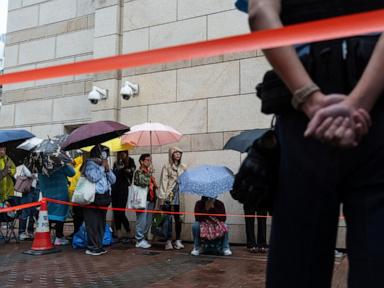45 years after the Greensboro Massacre

On Nov. 3, 1979, Ku Klux Klansmen and neo-Nazis ambushed and killed five leftist demonstrators at an anti-racist rally in Greensboro, North Carolina. Assailants wounded 10 other Maoist Communist Workers Party members and traumatized scores more at Morningside Homes, a predominately African American public housing project.
The “Greensboro Massacre” is a cautionary tale, with contemporary resonance, about how to confront racist extremism and violence — and how not to.
I was there that day, helping to report on the shootings’ aftermath for the New York Times. Dr. Michael Nathan, my Duke classmate and friend, was slain; other friends were wounded. Later, I covered the subsequent state criminal trial.
The anniversary coincides with the release of Aran Shetterly’s excellent new book, “Morningside: The 1979 Greensboro Massacre and the Struggle for an American City’s Soul.”
City leaders blamed the attack on “outsiders” — a common Southern whites’ civil-rights-movement trope, as Shetterly notes. Greensboro was named an “All American City” in 1967, partly for its allegedly healthy racial climate.
In the aftermath of the shootings, Mayor Jim Melvin “hustled to manage the crisis that threatened to tarnish his city’s carefully cultivated reputation as a beacon of business-friendly, progressive Southern politics,” according to Shetterly. Melvin insisted the shooting “had absolutely nothing to do with our city,” as if malicious intruders had left a dead cat on their pristine neighborhood’s front step.
“Not a single person involved was from our city,” Melvin said.
Not quite true. Some of the Klansmen were from the Greensboro area. And while most demonstrators were outsiders, Nelson Johnson, a charismatic protest leader and community activist, was a student at Greensboro’s historically Black North Carolina A&T University. Many outraged whites considered Johnson a “bete noire,” a Black beast. Shetterly tells the Greensboro Massacre story largely through the lives and words of Johnson and his wife, Joyce Hobson Johnson.
The Greensboro murders went unpunished. Two all-white state and federal juries acquitted the white supremacists. None of them served prison time. A subsequent federal civil suit awarded Mike Nathan’s family $350,000, possibly because he — a physician, not a Communist Workers Party member — had opposed holding the demonstration. Two wounded survivors received much smaller awards. Klansmen and Nazis paid nothing to the deceased’s families.
Shetterly recently said the federal civil verdict barely enabled massacre survivors to “eke out a sliver of justice.” The verdict did, however, confirm the central roles of two provocateurs: a Greensboro Police Department informant and a Federal Bureau of Alcohol, Tobacco and Firearms agent.
Last month, Shetterly spoke to a racially mixed crowd, mostly seniors, at the Greensboro Museum of History, sponsored by the city’s civil rights commission. The crowd of about 200 squeezed into the small auditorium, evidence that the wounds of 1979 persist.
Shetterly said this was a “night I have been imagining for a long time.” He said racism plus local and federal law enforcement incompetence made the ambush possible, enabling the Klansmen and Nazis to drive their armed caravan down a narrow street unimpeded. No police attended the shooting site, despite their documented knowledge of the attackers’ plans. The verdicts proved “the lack of accountability empowered impunity” among white supremacists in following years.
Communist Workers Party cadres had focused on building area textile unions and combatting resurgent violent white supremacy. “If capitalism didn’t soon collapse like a rickety house of cards they believed it to be, they’d agitate to dismantle it,” Shetterly writes.
Nelson Johnson signed an open letter to “All KKK Members and Sympathizers,” calling white supremacists “scum” and “racist cowards.” At the Nov. 3 rally, the protesters promised, the Klan would be “smashed physically,” receiving “no mercy.” Johnson taunted them for an earlier encounter when party members had disrupted a Klan screening of “Birth of a Nation.”
Assailants took the leftists’ inflamed, blustering rhetoric literally. The Greensboro Police Department prohibited demonstrators from carrying weapons, but demonstrators kept some shotguns and small pistols concealed in cars. Klansmen and Nazi vehicle trunks contained an arsenal of shotguns and assault rifles. Essentially, the demonstrators had brought a knife to a gunfight.
The 1979 encounter was a personal tragedy for the victims’ families and friends. But over time, survivors acknowledged that the “Death to the Klan” rally, while well-intentioned, was a strategic disaster.
“We have to admit that some of those leaflets were stupid,” said Dale Sampson, the widow of Bill Sampson. “Our mistake,” she said, was that “revolutionary zeal blinded us to what was going on inside the Klan, and it led us to a confrontation…We have to take responsibility for being there that day in the manner that we got there.”
Another widow, Signe Waller, agreed. “Military posturing,” she said, can make idealism dangerous. The Communist Workers Party had been naive, arrogant and hotheaded, she said. “I think a healthy dose of humility would have served me and some of the rest of us.”
In August 2005, Nelson Johnson, now an ordained Baptist minister, issued a wide-reaching apology to the city at a Truth and Reconciliation Commission.
“I deeply regret the use of the slogan ‘Death to the Klan,’” he said. “In retrospect I am clear that it was an unfortunate, ill-advised slogan…I very much regret that a flyer was developed in the form of a letter that called Klan members cowards and challenged them to come from under their rocks and face the wrath of the people. That was wrong.” The Greensboro Daily News did not report Johnson’s remarks.
For years, Greensboro refused to acknowledge its flaws, as noted in Duke historian William Chafe’s classic, “Civilities and Civil Liberties: Greensboro, North Carolina, and the Black Struggle for Freedom.” It took the city decades to embrace the central role it played as the locus of the 1960 sit-ins in the Civil Rights Movement. A downtown museum now celebrates that. Would it take decades more for city leaders to accept and celebrate the 1979 martyrs’ idealism and heroism?
The city establishment dragged its feet accepting responsibility for its role in the ambush, unwilling to give a full-throated apology or endorse a historical marker at the site. Then came George Floyd’s killing, Black Lives Matter and Charlottesville’s deadly “Unite the Right” demonstration, which inspired Shetterly’s book.
In October 2020, the Greensboro City Council finally issued a full apology statement.
Mark I. Pinsky is a journalist and the author of seven nonfiction books.
-
Super Micro's 45% plunge this week wipes out stock's gains for the year
Business - CNBC - November 1 -
AppLovin, top tech stock of the year, soars another 46% on earnings beat
Business - CNBC - November 7 -
45 activists sentenced in Hong Kong national security case. The longest term is 10 years
World - ABC News - 5 days ago -

45 pro-democracy activists get 4 to 10 years in prison in Hong Kong
World - ABC News - 4 days ago -
3 observations after Maxey (45 points) hammers through slump, lifts Sixers to OT win
Sports - Yahoo Sports - October 27 -

Trail Blazers coach Chauncey Billups rips 'f---ing embarrassing' effort in memorable rant after 45-point loss
Sports - CBS Sports - November 11 -

No. 8 Houston routs Louisiana 91-45 to rebound after loss to No. 5 Auburn on Saturday
Sports - ABC News - November 13
More from The Hill
-

Hulk Hogan suggests Trump may nominate him for position in administration
Politics - The Hill - 2 hours ago -

CNN's Abby Phillip: Democrats' problems 'not as simple as wokeness'
Politics - The Hill - 2 hours ago -

Taiwan's former president says US should prioritize helping Ukraine over her country
Politics - The Hill - 3 hours ago -

Republican senator predicts Gaetz wouldn't win Florida governorship after he teases run
Politics - The Hill - 4 hours ago -

Democratic rep tells Americans to 'calm down' amid concerns over Trump Cabinet picks
Politics - The Hill - 6 hours ago
